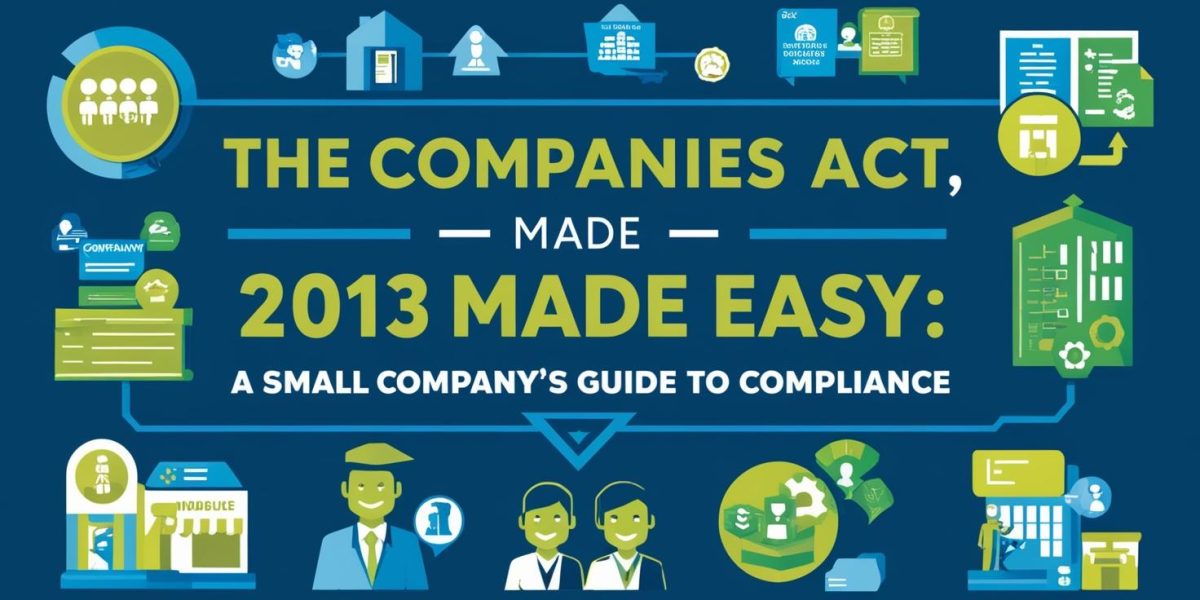The Companies Act, 2013 might sound like a giant mountain of legal jargon, but for small companies, it doesn’t have to be that scary. If you’re running or planning to start a small company in India, understanding your legal responsibilities can save you a ton of trouble later. This guide breaks down everything you need to know in plain, simple language.
Understanding the Basics
What Qualifies as a “Small Company”?
A “small company” under the Companies Act, 2013 isn’t based on your team size—it’s about your financials. Here’s what counts:
-
Paid-up share capital: Not more than ₹4 crore (as per 2021 amendments)
-
Turnover: Not exceeding ₹40 crore in the preceding financial year
These figures might change with new amendments, so it’s smart to double-check with the latest MCA updates.
Key Differences Between a Small Company and Others
Unlike public companies or private companies above these thresholds, small companies enjoy more flexibility. Think of it like flying economy with extra legroom—you still follow the rules, but it’s a lot more comfortable.
Benefits of Being a Small Company Under the Act
Why does it matter if you’re considered a small company? Here’s why:
-
Less paperwork – Fewer compliance forms to deal with
-
No mandatory rotation of auditors – Unlike bigger players
-
Lower penalties – In case you slip up
-
No need to appoint a Company Secretary – Which is great news for small teams
Key Compliance Requirements
While the bar is lower, it doesn’t mean you can ignore compliance altogether.
Incorporation Essentials
Starting out? Here’s what you’ll need:
-
Name reservation via RUN (Reserve Unique Name) service on MCA portal
-
Digital Signature Certificate (DSC) for directors
-
Director Identification Number (DIN)
-
e-MOA and e-AOA (electronic versions of Memorandum and Articles of Association)
Register via SPICe+ form, which makes the whole thing easier and faster.
Appointment of Directors and Key Personnel
-
A small company can have a minimum of 2 directors (for private companies).
-
DIN and DSC are a must before filing incorporation documents.
-
No requirement for a full-time Company Secretary if you’re a small company.
Board Meetings and Resolutions
Yes, you still need board meetings. But:
-
Only two meetings a year are required for small companies
-
Maintain minutes of meetings properly—digital records are acceptable
Annual Compliance Checklist
Let’s break it down into manageable tasks:
Form AOC-4
This is where you file your financial statements, including balance sheet, P&L, cash flow, etc.
Form MGT-7A
A shorter version of the annual return form made specially for small companies. Filed within 60 days of the AGM.
Auditor Appointment
Though audit may be exempted, if you do appoint one, file Form ADT-1.
Filing Deadlines
Missing deadlines = unnecessary expenses. Here’s a quick snapshot:
| Form | Deadline | Late Fee |
|---|---|---|
| AOC-4 | 30 days from AGM | ₹100/day |
| MGT-7A | 60 days from AGM | ₹100/day |
| ADT-1 | 15 days from AGM | ₹300 one-time |
Financial Reporting Simplified
Small companies are exempt from mandatory internal financial controls audits, which is one less thing to worry about.
You still need to:
-
Maintain accurate financial records
-
Ensure they match with bank statements and invoices
Secretarial Compliance Made Easy
Good news! If you’re a small company:
-
No Company Secretary needed
-
Secretarial Audit is not required
However, you must still comply with Secretarial Standard-1 (SS-1) and SS-2 related to board and general meetings.
Penalties for Non-Compliance
It’s tempting to skip a few steps, but it can cost you:
-
Monetary penalties ranging from ₹10,000 to ₹5 lakh
-
Director disqualification if non-compliance persists
-
Legal proceedings in serious cases
Play it safe—it’s cheaper in the long run.
Recent Amendments Favoring Small Companies
The Ministry of Corporate Affairs (MCA) has made life easier:
-
2021 Amendment: Increased threshold for small companies
-
Introduction of Form MGT-7A: Tailored for small businesses
-
Relaxation in board meeting requirements during COVID times (still under review in some cases)
Always keep tabs on MCA circulars.
Common Mistakes to Avoid
-
Filing wrong forms (e.g., using MGT-7 instead of MGT-7A)
-
Not updating director details in time
-
Forgetting to file AOC-4, even if the company is dormant
-
Assuming no compliance is needed because you’re “small”
Tips for Easy Compliance
-
Create a compliance calendar: Mark important dates
-
Use MCA’s email alerts: They’re actually helpful!
-
Hire a part-time consultant: Cheaper than a full-time CS
-
Use software tools for ROC filings
A little planning goes a long way.
Conclusion
Complying with the Companies Act, 2013 doesn’t have to feel like navigating a maze—especially for small companies. With the right information and a proactive approach, you can stay on the right side of the law without breaking a sweat. Think of this guide as your GPS. Stay informed, stay compliant, and your business will thank you for it.












